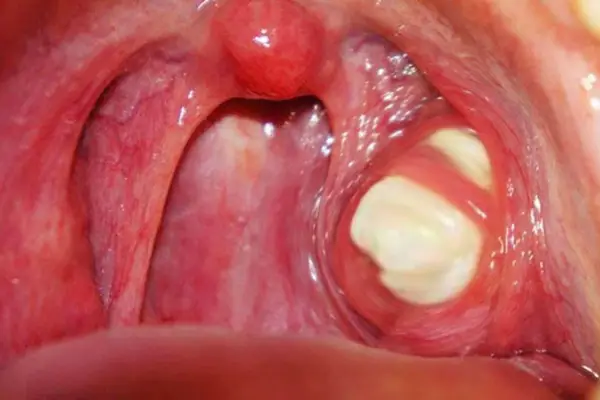Individuals with tonsil stones are often worried about how likely they are to swallow these stones but in reality, this happens more often than not without leading to any health problems.
Even though tonsil stones can lead to symptoms like bad breath, discomfort, and dysphagia (difficulty in swallowing), the composition of tonsillar calculi are minerals, microbes, and debris which are all easily digested, absorbed, or expelled by the digestive system when dislodged and swallowed.
What Are Tonsil Stones And What Do They Consist Of?
Scientifically known as tonsilloliths, tonsil stones are small, calcified deposits that form in the tonsillar crypts – the small pockets or grooves located in the tonsils at the back of the throat. Their function is to trap debris, bacteria, and fungi adding a layer of support to the immune system.
Tonsil stones consist primarily of calcium, but their composition can vary and may include other minerals such as magnesium, phosphorus, and ammonia. The exact composition can differ from one individual to another and even from one stone to another within the same individual.
The formation of tonsil stones is a gradual process that begins with the accumulation of various substances in the tonsillar crypts. This is relatively common and can occur in people of all ages, though they are more prevalent in adults than in children.
Small pieces of food can get trapped in the tonsil crypts after ingesting food or liquid. Furthermore, the tonsils naturally shed cells as part of the renewal process, and these cells can accumulate in the crypts.
The mouth contains a variety of bacteria as well as some mucus from post-nasal drip or mouth which can get lodged in the tonsils and contribute to stone formation.
What Happens If You Swallow Tonsil Stones?
When a tonsil stone is accidentally swallowed, it often goes unnoticed. Most people do not feel any discomfort or pain and are unaware as the stone passes through the esophagus and into the stomach. In the stomach, the acidic environment begins to break down the tonsil stone.
Once in the stomach, tonsil stones, like any swallowed object, are subjected to the digestive process. The acids and enzymes in the stomach work to dissolve the tonsil stone, breaking it down into smaller components. Given that tonsil stones are primarily composed of calcium and other minerals, they are generally easily processed by the digestive system.
While most tonsil stones are small and pass through the digestive system without issue, larger stones could potentially cause discomfort or a choking hazard. However, such instances are rare.
In very rare cases, if the stone is large enough, it might cause mild stomach discomfort or indigestion as it passes through the gastrointestinal tract.
There is a small risk of choking if the stone is large and gets stuck in the respiratory tract. This is more of a concern for larger stones and is a rare occurrence.
Symptoms Of Tonsil Stones
Tonsil stones, while often asymptomatic, can cause a range of symptoms, especially when they are large or numerous. The severity and type of symptoms can vary from person to person. Common symptoms of tonsil stones include:
- Bad Breath (Halitosis): The most common symptom associated with tonsil stones is bad breath. The stones are made up of a collection of material, including bacteria, which can produce sulfur compounds that emit a foul odor.
- Feeling of Obstruction: Many people with tonsil stones report a sensation of having something lodged in their throat or the back of their mouth.
- Sore Throat: Tonsil stones can cause irritation and inflammation of the tonsils, leading to a sore or painful throat. This discomfort can be persistent or come and go.
- Difficulty Swallowing: Large tonsil stones or a significant number of stones can cause discomfort or obstruction, making swallowing food or liquids challenging or uncomfortable.
- Ear Pain: Due to shared nerve pathways, tonsil stones can sometimes cause referred pain in the ear, leading to an earache.
- White or Yellow Debris: Tonsil stones are often visible as small white or yellow lumps on the tonsils. They might be seen when examining the mouth and throat.
- Coughing: Occasionally, tonsil stones can trigger a cough, which might be the body’s way of trying to dislodge and expel them.
- Altered Taste: In some cases, tonsil stones can affect the sense of taste, either due to their presence or because of the associated bacterial overgrowth.
How Can You Tell if You Have Swallowed Tonsil Stones?
You almost can’t determine if you have swallowed tonsillar calculi because it’s often small and hard to even notice. However, a sudden disappearance of symptoms like a sensation of something stuck in your throat or discomfort around your tonsils could indicate that you’ve swallowed a stone.
Additionally, if you notice an unpleasant taste or a slight sensation in your throat as the stone is dislodged, it might suggest that you have swallowed it. In most cases, swallowing a tonsil stone is harmless and doesn’t cause noticeable symptoms.
When Should You Be Concerned?
While tonsil stones are generally not a cause for serious concern, there are certain situations where medical attention might be necessary. Being aware of these scenarios can help you decide when to seek professional advice:
- Persistent or Severe Symptoms: If you experience ongoing or severe symptoms related to tonsil stones, such as chronic bad breath, sore throat, or discomfort in the throat, it’s advisable to consult a healthcare professional.
- Difficulty Swallowing or Breathing: If tonsil stones are large enough to obstruct your throat, leading to difficulty swallowing or breathing, immediate medical attention is necessary. This is a rare but potentially serious complication.
- Signs of Infection: If you have symptoms like fever, swollen lymph nodes, or severe and persistent sore throat, it could indicate an infection, such as tonsillitis, which requires medical evaluation and treatment.
- Recurring Tonsil Stones: If you frequently develop tonsil stones despite good oral hygiene and preventive measures, it may be beneficial to discuss them with a healthcare provider. In some cases, chronic tonsil stones can be a sign of underlying issues with tonsil tissue or immune function.
- Pain and Discomfort: If tonsil stones cause significant pain or discomfort that interferes with your daily life, seeking medical advice is recommended. A healthcare professional can provide treatment options to alleviate pain and address the stones.
- Bleeding Tonsils: If you notice bleeding from the tonsils, especially while trying to remove tonsil stones, it’s important to stop any home removal attempts and consult a doctor. Bleeding could be a sign of injury to the tonsil tissue.
- Unsure About Diagnosis: If you’re uncertain whether what you’re experiencing is due to tonsil stones or another condition like tonsillitis, it’s always better to get a professional opinion. Similar symptoms can be caused by other medical issues that may require different treatments.
Home Remedies To Dislodge Tonsil Stones Without Swallowing
Dislodging tonsil stones without swallowing them can be achieved through various home remedies. These methods are generally safe and can be effective, but it’s important to be gentle to avoid irritating or damaging the tonsils:
Saltwater Gargle: Mix a teaspoon of salt in a glass of warm water and gargle. This can help loosen the stones and reduce any associated inflammation.
Cotton Swab or Q-tip: After moistening the swab with water, gently press on the area around the stone to try and dislodge it. Be very careful not to press directly on the tonsil to avoid causing harm.
Oral Irrigator or Water Flosser: Set to a low pressure, these devices can help flush out tonsil stones. Direct the water stream at the edges of the stones to try and dislodge them.
Dental Irrigation Syringes: Similar to water flossers, these can be used to direct a stream of water at the tonsil stones to loosen them.
Coughing: A strong cough can sometimes dislodge tonsil stones naturally.
Manual Removal with Clean Hands: If you can see the stone and easily reach it, you might try to gently push at the base of the stone with a clean finger. However, this can trigger a gag reflex and should be done cautiously.
Preventing Tonsil Stone Formation
Incorporating these practices into your daily routine can significantly reduce the likelihood of developing tonsil stones and help maintain overall oral and throat health.
Maintain Good Oral Hygiene: Brush your teeth twice a day and floss daily to remove food particles and bacteria that can contribute to tonsil stone formation.
Use a Tongue Scraper: Cleaning your tongue regularly can help remove bacteria and debris that could end up in the tonsils.
Stay Hydrated: Drinking plenty of water keeps the mouth moist and helps flush out food particles and bacteria.
Avoid Dry Mouth: Use alcohol-free mouthwash and consider using a humidifier if you live in a dry environment to prevent dry mouth, which can contribute to stone formation.
Limit Dairy Intake: Dairy products can increase mucus production, which can lead to more debris in the tonsils.
Quit Smoking: Smoking and secondhand smoke can increase the risk of tonsil stones due to the chemicals and bacteria introduced into the mouth.
Regular Inspection of Tonsils: Use a flashlight and a mirror to regularly check your tonsils for stones.
Routine Oral Care: Visiting your dentist on a regular basis for cleanings and check-ups can help maintain overall oral health and potentially reduce the risk of tonsil stone formation.
Dentists can remove tartar and plaque that you can’t remove with regular brushing and flossing, reducing the overall bacterial load in the mouth.
If you frequently develop tonsil stones despite good oral hygiene, consult a healthcare professional. They might recommend additional treatments or procedures, such as a tonsillectomy in severe cases.
Is Swallowing Tonsilitis Pus Harmful?
Swallowing pus from tonsillitis is generally not harmful. The pus is composed of dead white blood cells, bacteria, and other debris resulting from the infection in the tonsils. When swallowed, this material is broken down by the stomach acid and does not pose a health risk.
However, it’s important to address the underlying tonsillitis, which can be a bacterial or viral infection. Treatment may involve antibiotics for bacterial tonsillitis, pain relief, and other supportive measures. If you have concerns about tonsillitis or its symptoms, it’s best to consult a healthcare professional for proper diagnosis and treatment.
Does Tonsil Stones Fall Out On Its Own?
Over time, these stones can dislodge due to coughing, swallowing, or natural movements of the mouth and throat. But, in some cases, they may persist and require manual removal or professional treatment, especially if they cause discomfort, bad breath, or other symptoms.





